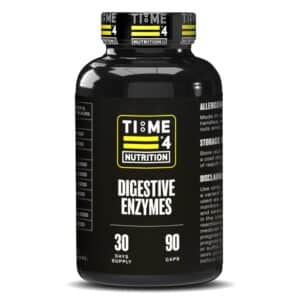What are Digestive Enzymes?
What are Digestive Enzymes?
What are Digestive Enzymes?
It is well known that an inadequate intake of key nutrients can result in a range of nutrient deficiency-related issues, and if severe enough and sufficiently prolonged, ultimately starvation. However, that is only half the story: Less well understood is the fact that if our nutrient intake is sufficient but digestion and/or absorption is poor, this can result in similar consequences.
The digestive process is key to ensuring we get the maximum benefit from the food we consume. Unfortunately, we give little consideration to our digestive system unless we are experiencing an obvious problem such as a stomach upset. There is a tendency to assume that if we eat the recommended amount of key nutrients, we are bound to gain its full benefits. Take protein, for example. According to the International Society of Sports Nutrition (1) we need to consume approximately 2 grams of protein per kilo of body weight per day to build and maintain lean muscle. There is even some novel evidence that this may need to be increased to more than 3g/kg when trying to maintain muscle while reducing bodyfat. Just because we consume the recommended intake, this is no guarantee of the amount of muscle building amino acids that enter our blood stream and ultimately end up fuelling the growth and maintenance of our muscles. Two people may consume an identical diet but the benefits they receive may differ depending on the health and effectiveness of their digestive system.
This involves various organs, which include the gastrointestinal tract (the mouth, oesophagus, stomach, small intestine, large intestine and anus) the liver, pancreas, gallbladder, teeth, tongue and salivary glands. It has 3 primary functions: digestion, absorption, and elimination.
Digestion is the process in which large food molecules are broken down to smaller molecules. Absorption involves the transportation of the smaller molecules across the intestinal wall into the blood stream to be used by the tissues of the body. Elimination is the fate of undigested components of food and waste products that are removed from the body.
When we think of digestion, we tend to think of the stomach but the digestion of each nutrient occurs in different areas of the digestive system. The digestion of carbohydrates takes place in the mouth, stomach and small intestine. Proteins are digested in the stomach and small intestine, while the digestion of fat occurs in the small intestine.
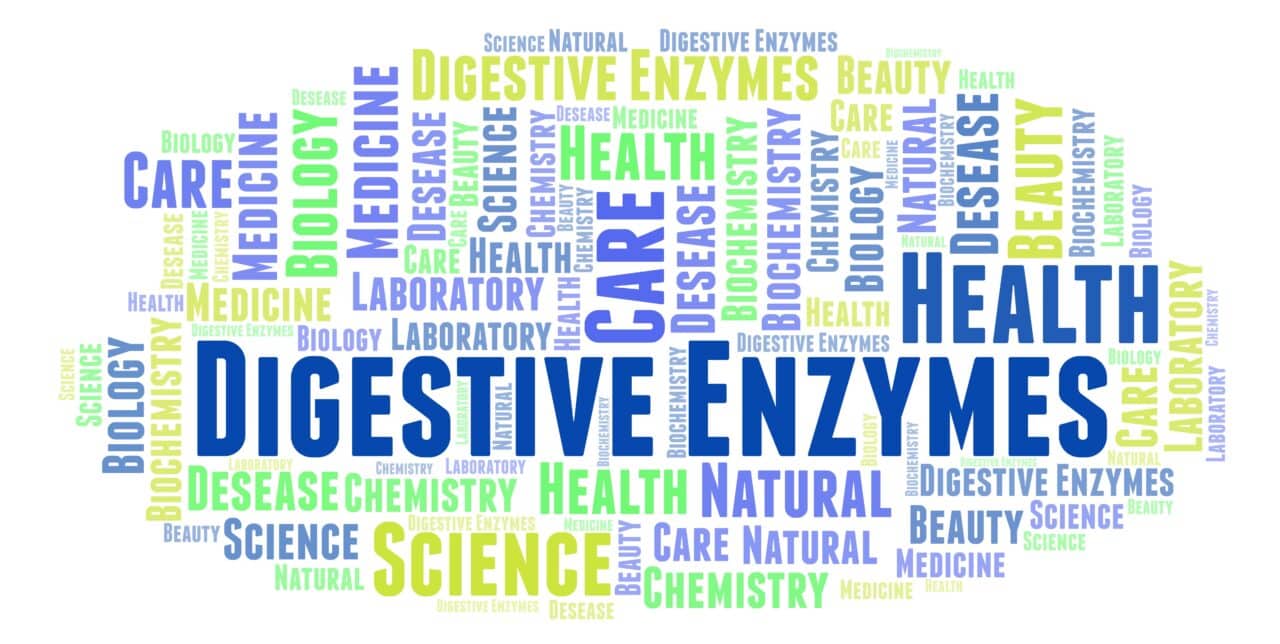
Digestive enzymes and digestion
Digestion involves chewing, which breaks food into smaller parts, and a chemical process which further breaks it down into its basic units through the release of acids and digestive enzymes. These are special proteins produced by the body to digest food. They are released by the salivary glands and cells lining the stomach, pancreas, and small intestine and secreted into the digestive tract, where they help to break down food into its component nutrients. They do this by splitting the large, complex molecules that make up proteins, carbohydrates, and fats into smaller ones. This then allows them be absorbed across the gut wall into the bloodstream, which transports them to where they are needed in the body, such as the exercising muscles. The digestion of each macronutrient, i.e., carbohydrate, fat and protein, requires a different type of enzyme.
Why do we need to supplement with digestive enzymes if our body produces them?
Circumstances may arise that inhibit our ability to produce digestive enzymes and/or use them effectively. This in turn will affect our ability to absorb all the nutrients from the food and supplements we consume, which may have a negative effect on both our health and performance.
For example, as we age enzyme production tends to decline. This becomes more pronounced over the age of 45 years. Chronic stress, poor diet and certain medical conditions can all have a negative impact on our ability to produce and use digestive enzymes effectively.
Typically, in these cases you may experience symptoms such as wind, bloating, indigestion, diarrhoea, constipation, and weight loss due to incomplete digestion. When our food is not completely broken down it can cause irritation in the digestive tract as well as poor nutrient absorption. Undigested food in the colon causes discomfort and can result in a reduction in healthy gut bacteria and harmful bacteria to thrive.
Note: It is important to understand that such symptoms can be due to a variety of conditions and should be assessed by a suitably qualified health care professional. In addition, the treatment of certain digestive disorders requires the use of prescription only digestive enzymes. For example, exocrine pancreatic insufficiency is a condition where the pancreas fails to produce sufficient digestive enzymes. If such a digestive disorder is known or suspected, you should consult a suitably qualified health care professional.
Another factor to consider is the volume of food you consume. The intake of a competitive bodybuilder is likely to be much greater than that of a sedentary person of an average size. For example, 8-time Mr Olympia winner Ronnie Coleman is reputed to have consumed approximately 540g of protein, 474g of carbohydrates and 150g of fats daily at bodyweight of 140 kg (300 pounds). Although the efficiency of your digestive system is not solely dependent on the amount of digestive enzymes you produce, the more food there is to digest, the more enzymes your body needs to produce to cope with the increased workload. Consequently, digesting and absorbing large amounts of food can place considerable stress on the body.
This is where Time 4 Digestive Enzymes can make a valuable addition to your nutrition strategy.
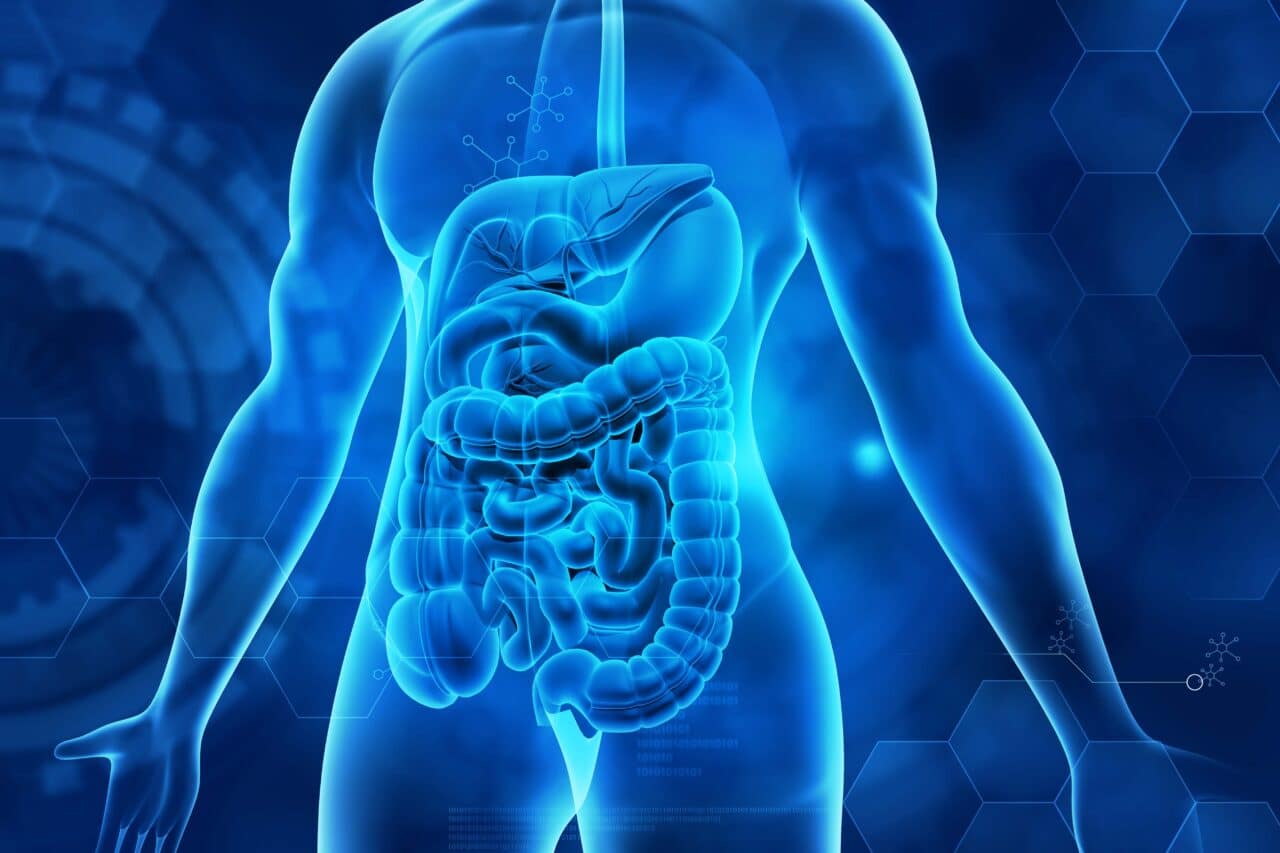
What are the benefits of Time 4 Digestive Enzymes?
The ingredients in Time 4 Digestive Enzymes have been shown scientifically to provide a range of benefits for health and performance. These include, but are not limited to:
- Enhancing nutrient digestion (8, 12, 16, 17, 18 21, 22, 23,)
- Improving nutrient absorption (5, 8, 21, 22)
- Reducing digestive discomfort (16, 17, 18, 19, 20, 21, 22, 23, 24, 27)
- Improving gut health (5, 6, 21, 25, 26, 28, 29)
- Reducing inflammation (6, 8, 9, 25, 26)
- Reducing post-exercise soreness (10, 11)
- Enhancing post-exercise recovery (9, 10, 11)
- Reducing muscle strength losses after intense exercise (9,10,11)
- Increasing muscle growth (8, 12)
- Increasing muscle protein synthesis (8)
- Enhancing immune function (9, 28, 29)
- Improving glucose tolerance (13, 14, 15)
- Maintaining healthy body composition (8, 14, 15)
- Reducing lactose intolerance (19, 20)
- Balancing gut microbiota (6, 28, 29)
What’s in Time 4 Digestive Enzymes?
Time 4 Digestive Enzymes contains a combination of 8 specially selected, evidence-based substances, including 6 different digestive enzymes, that work synergistically to aid digestion, optimise the absorption of nutrients by the body and reduce issues associated with poor digestion. These include Betaine HCL, Ox Bile (45% Cholic Acid), Protease, Amylase, Lipase, Lactase, Papain, and Bromelain.
As we look at each of these in-depth, and a selection of the research that supports their use, you’ll begin to see why Time 4 Digestive Enzymes is such a great product and how it may benefit you.
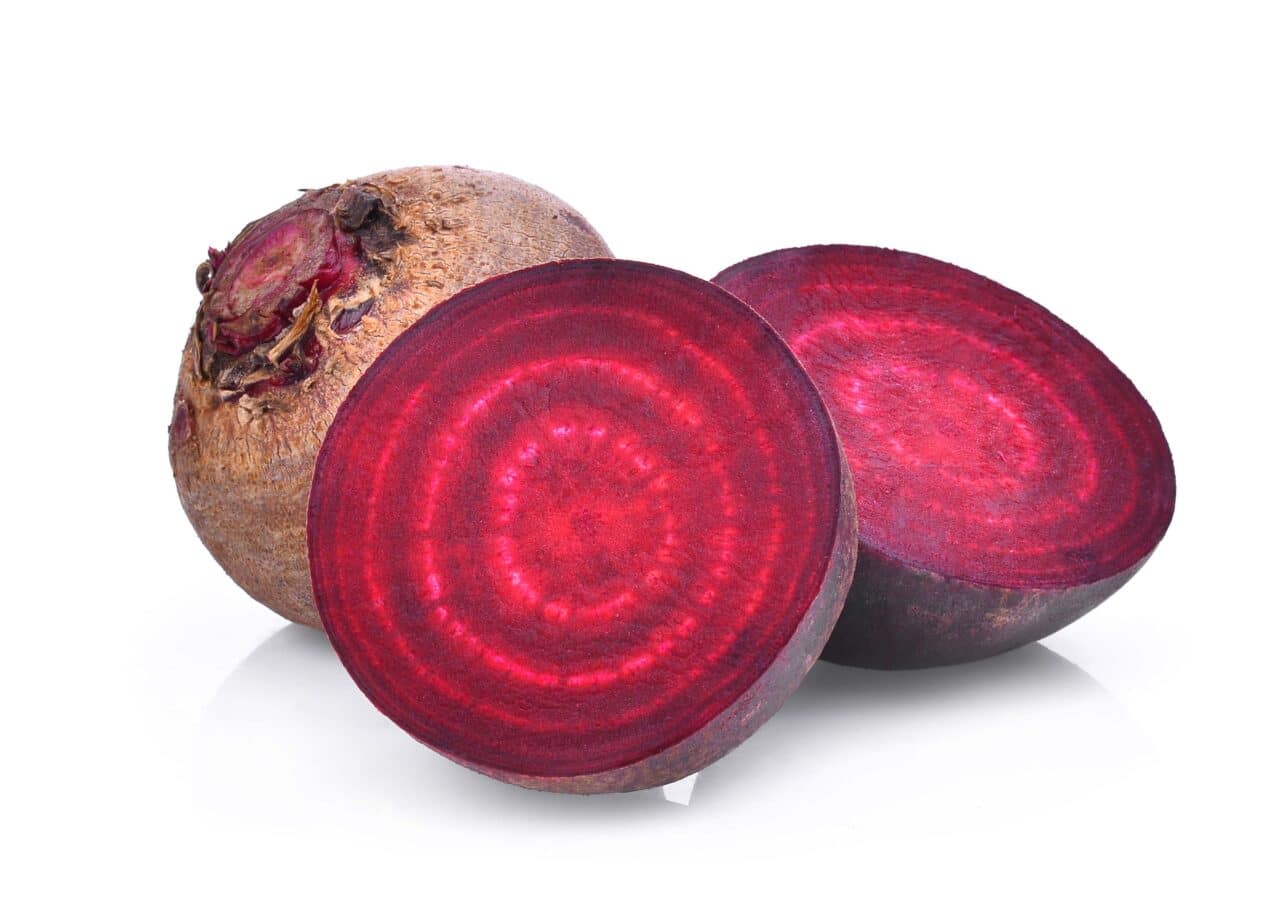
What is Betaine HCL?
Betaine Hydrochloride (HCL) is a combination of betaine, a compound found in certain foods such as beets and spinach, with hydrochloride, an acid salt that contributes to hydrochloric acid, the stomach’s primary acid source. It is most commonly used to increase hydrochloric acid levels in the stomach, which aids digestion, particularly of protein, improves nutrient absorption, and supports overall gastrointestinal health. It is often combined with protease to enhance the digestion of protein.
What does the science say about Betaine HCL and digestion?
Hypochlorhydria is the term used to describe low levels of hydrochloric acid in the stomach, which can have a profound impact on the body’s ability to digest and absorb nutrients, and in extreme cases, if left untreated, can cause damage to the gastrointestinal (GI) system, infections, and a variety of chronic health issues. Typical symptoms of hypochlorhydria include bloating, burping, indigestion, and nausea, upset stomach and wind. A number of risk factors are associated with hypochlorhydria including being over 65 years of age, high levels of stress, vitamin deficiency and the use of medications that reduce stomach acid.
The use of Betaine HCL to increase levels of stomach acid has been investigated by a number of studies (2, 3).
Yago et al., (2) evaluated the effects of a dose of Betaine HCL in healthy volunteers with pharmacologically induced hypochlorhydria. The results showed that within an average of just 6 minutes of receiving a single dose of Betaine HCL, acidity in the stomach increased.
In a review, Guilliams and Drake (3) investigated the evidence relating to the use of mealtime supplementation with Betaine HCL to treat functional hypochlorhydria and concluded that Betaine HCL taken minutes prior to a meal or divided and taken throughout the meal can improve stomach acidity. Furthermore, the authors suggest these results indicate that supplemental mealtime Betaine HCL is safe, appropriate, and necessary, in subjects on PPI therapy to reduce common PPI side-effects, such as protein/micronutrient/drug malabsorption, food-borne microbial survival, or slow gastric emptying. Proton pump inhibitors (PPIs) are a group of medicines that decrease stomach acid production. They can help relieve symptoms of chronic acid reflux and stomach ulcers.
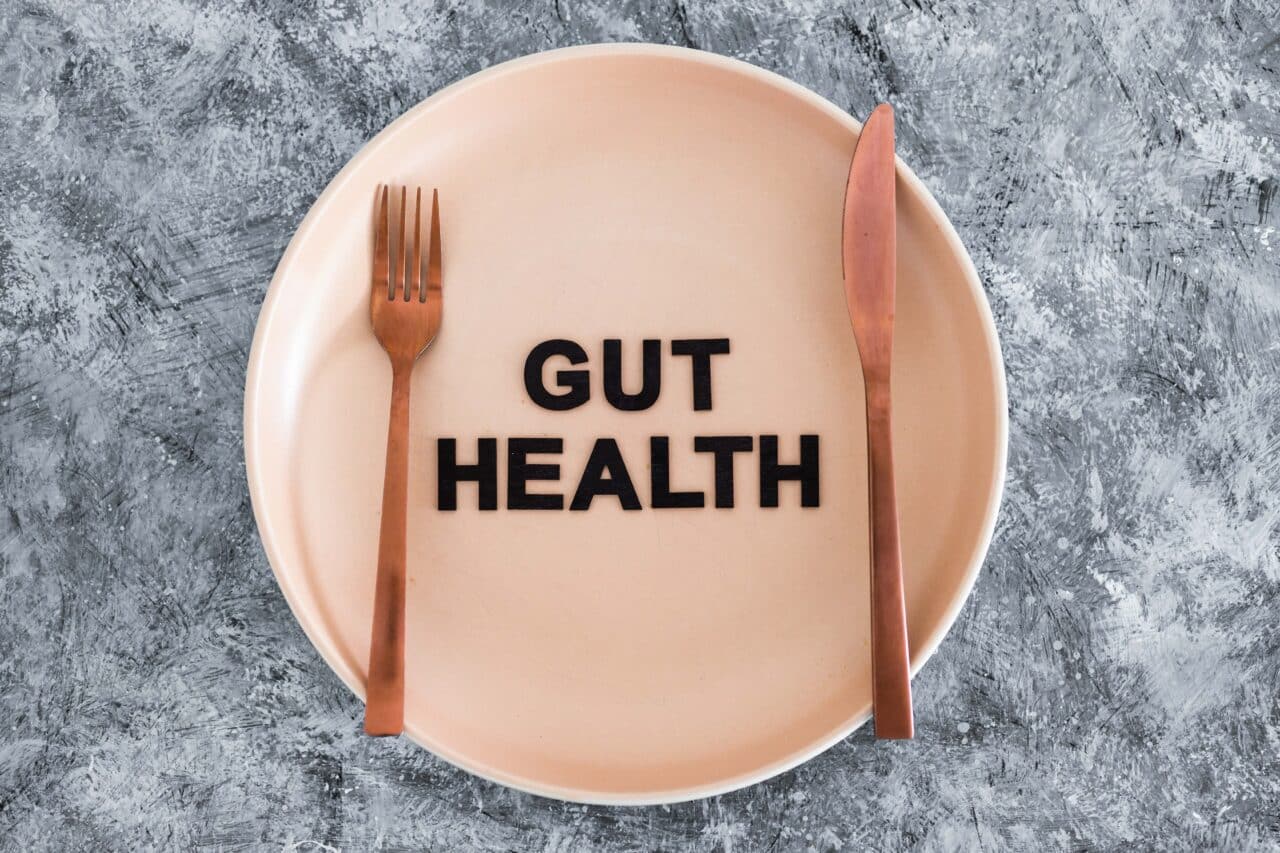
What is Ox Bile?
Bile is a digestive liquid produced in the liver and stored in the gall bladder from where it is released during mealtimes. It contains various components, including bile salts (also known as bile acids), cholesterol, electrolytes and water. It plays a critical role in the digestion of fats so that they can be absorbed and helps to remove toxins and waste from the body. Ox bile is derived from purified bovine bile and contains bile salts almost identical to those produced in our liver. These salts exert the same physiological functions and health benefits as endogenous bile salts, which include supporting fat digestion, enhancing the absorption of fat soluble nutrients, such as the vitamins A, D, E, and K and Omega-3 fatty acids, reducing the risk of gallstones and constipation, and promoting liver function and intestinal health. Bile maintains the pH balance of the digestive system by neutralizing stomach acid as it enters the small intestine and has potent antimicrobial properties.
A lack of bile salts is associated with a number of gastric issues including diarrhoea, stomach cramps, erratic bowel movements, weight loss, wind, and pale-coloured stools.
What does the science say about Ox Bile and digestion?
Traditional Chinese Medicine has used ox bile for centuries to manage various health issues, including gastrointestinal symptoms and inflammatory conditions. Now a considerable body of scientific studies also supports its use (4, 5, 6, 7).
A review by Wang and Carey (4) highlighted numerous benefits provided by supplementation with bile salts in addition to aiding digestion. These include improving liver function, dissolving gallstones, inhibiting bacterial and viral multiplication, promoting cardiac function, as well as exhibiting anti-inflammatory, fever reducing, anti-oxidant, sedative, anti-convulsive, anti-allergic, anti-congestive, anti-diabetic and anti-spasmodic effects.
A healthy, well-functioning digestive system is crucial for optimising nutrient digestion and absorption. A study by Perrone et al., (5) showed that supplementation with a bile salt which occurs naturally in Ox bile, known as TUDCA (taurodeoxycholic acid), helps to protect the gut. Specifically, it is protective of the intestinal lining by increasing resistance to injury-induced cell death, stimulating the proliferation of the cells of the gut lining, and increasing the length of the villus, finger-like processes in the gut that are crucial for the absorption of nutrients from digested food.
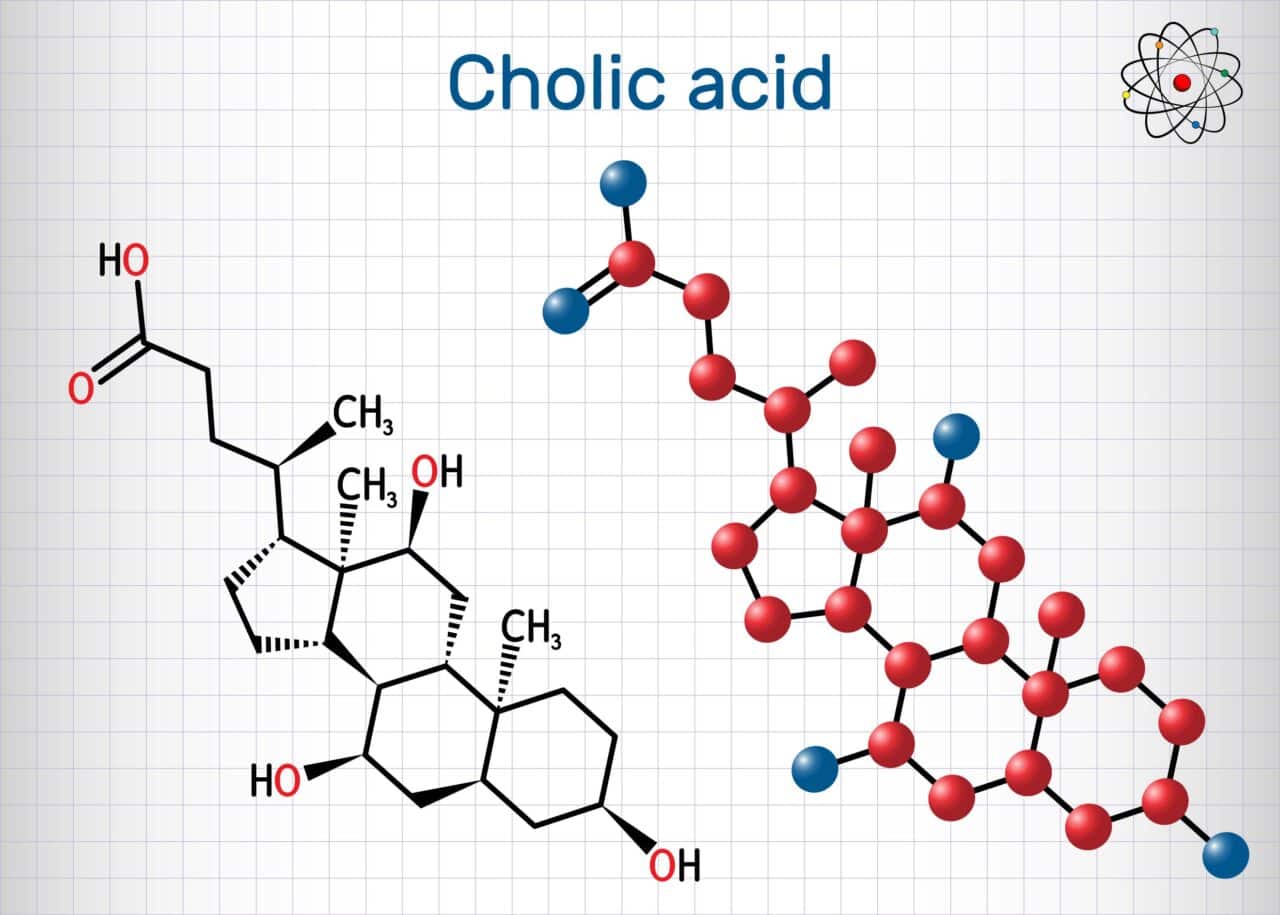
Time 4 Cholic Acid support
Ox bile and Betaine HCL form Time 4 Digestive Enzymes’ cholic acid support blend. Cholic acid is a primary bile acid that is produced in the liver from cholesterol. It plays a crucial role in the digestion process by helping to emulsify fats and facilitate the absorption of dietary fats and fat-soluble vitamins.
So important is cholic acid for normal fat metabolism, that is used medicinally under the brand name CHOLBAM to treat people with bile acid synthesis disorders by increasing Cholic acid levels in the body.
What is Protease?
Amino acids are the building blocks of the body and life itself. While our body can produce some, others need to be obtained from our diet where they are contained in proteins. These are large molecules made from amino acids joined together to form chains. In order for us to obtain the benefit of the amino acids contained in the protein foods we consume, such as meat, eggs, fish, dairy products and plant-based proteins, the body must first break down these more complex protein structures into their component amino acids, which can then be transported in the blood to where they are needed in the body. This is the role of protease, a type of digestive enzyme produced in the stomach, pancreas, and small intestine. By breaking protein down into smaller peptides and individual amino acids, protease facilitates their digestion and absorption by the body so that they can perform a vital role in numerous processes such as tissue growth and repair and immune function. In addition to its role in protein digestion and absorption, protease has been associated with a range of other benefits including enhancing immunity, cardiovascular health, tissue repair, muscle recovery and growth, and reducing inflammation.
What does the science say about Protease and digestion?
While amino acids perform countless important functions in the body, from maintaining healthy skin, hair, and nails to boosting immunity, their role in muscle tissue growth and repair and post-exercise recovery tends to be of the greatest interest to the majority of individuals engaged in regular exercise. A number of studies have shown that supplementation with protease can enhance the ability of amino acids to perform this role (8, 9, 10).
Whey protein is a popular and effective supplement for increasing protein intake, with many studies supporting its use (1). Some products suggest serving sizes as high as 50g. However, due to possible inhibition of endogenous digestive enzymes from over-processing and rapid small intestine transit time, the average amount of liquid whey protein that is absorbed may be only 15g. The combined effect of these factors may contribute to incomplete digestion, thereby limiting the absorption rate of protein before it reaches the colon and is eliminated as waste.
The results of a study by Oben et al., (8) showed that supplementation with protease enzymes blended with whey protein, increased the rate of protein absorption. The results indicated a faster rate of amino acid absorption reflected in significantly higher blood levels of amino acids and increased nitrogen retention, an indicator of muscle protein synthesis. It is for this reason that we have added digestive enzymes to our Time 4 Whey Protein Professional.
Another interesting finding of the study was significantly reduced levels of C-reactive protein (CRP). This is a substance produced by the liver in response to inflammation in the body, and is regarded as a sensitive marker of inflammation. Although CRP itself does not have a direct role in the synthesis of muscle proteins, it signals the presence of inflammation.
Elevated levels of CRP can be indicative of muscle damage or stress, which can subsequently lead to a temporary decrease in muscle protein synthesis. This is because inflammation can initiate a catabolic state in the body, where muscle breakdown may occur at a faster rate than muscle repair and synthesis. Therefore, reduced levels of CRP indicate reduced inflammation and reduced muscle catabolism.
Another benefit of protease supplementation is its ability to enhance post-exercise recovery and reduce muscle damage and soreness. A study by Buford et al., (9) found that protease supplementation reduces muscle strength losses after eccentric exercise by regulating immune activity and inflammation. Eccentric exercise involves tensing a muscle while lengthening, such as the downward phase of a squat, which can result in considerable muscle damage and soreness and a temporary loss of strength. Although this from of muscle damage can help to stimulate muscle growth and strength, it can hinder your ability to train, which in turn, may inhibit your progress if the damage is severe or prolonged.
Other studies have found similar results. Miller and colleagues (10) investigated the effects of protease supplementation on muscle soreness and contractile performance after downhill running, which involves a considerable amount of muscle damaging eccentric activity. The findings showed that protease supplementation reduced muscle soreness and facilitated muscle healing to allow faster restoration of contractile function after intense exercise compared to a placebo.
Beck et al., (11) also found that supplementation with protease helps to reduce strength loss immediately after eccentric exercise and aid short-term strength recovery.

What is Amylase?
Amylase is the digestive enzyme responsible for the digestion of carbohydrate. It does this by breaking down complex carbohydrates (polysaccharides) into smaller disaccharide units (two glucose molecules), eventually converting them into the monosaccharide (one glucose unit), which can then be absorbed easily and used by the body for energy production. Amylase is produced in the mouth (in saliva) and pancreas and be taken as a supplement. In addition to enhancing nutrient digestion and absorption and reducing symptoms such as bloating and wind, Amylase is also associated with increased energy production, improved ability to tolerate stress, enhanced immunity and blood glucose regulation, and has anti-inflammatory and anti-ageing properties.
What does the science say about Amylase and digestion?
Studies have shown that Amylase supplementation can provide a number of benefits including improved digestion and increased energy. A study by Aderibigbe and colleagues (12) investigated the carbohydrate and energy digestibility of chickens that were fed diets supplemented with Amylase. The results showed that Amylase was effective in improving growth and carbohydrate and energy digestibility.
Much of the science regarding Amylase relates to the problems associated with low levels. This may occur due to a variety of causes such as disease of the liver or pancreas. A high carbohydrate diet can also be a cause of Amylase deficiency: When a high volume of complex carbohydrate is consumed in the diet there is an increased demand for Amylase. After a prolonged period, the levels of Amylase fall below normal which results in deficiency. 4-time Mr Olympia winner, Jay Cutler, consumed somewhere between 400g up to a massive 1,000g of carbohydrates per day! This would place a considerable strain on the body’s ability to digest and absorb such amounts of carbohydrates.
While higher amylase levels are associated with better glucose tolerance after eating starch-rich meals. Studies show that low amylase levels are linked to insufficient insulin production and increased insulin resistance (13, 14, 15). Consequently, individuals with low Amylase are at greater risk of insulin resistance and type 2 diabetes when consuming starch-rich diets.
A review by Nakajima (13) demonstrated how low serum Amylase (hypoamylasemia) has been associated with certain common cardiometabolic conditions such as obesity, diabetes (regardless of type), and metabolic syndrome, all of which are related to insufficient insulin action due to insulin resistance and/or diminished insulin secretion.
The findings of a further study by Nakajima and colleagues (14) showed that serum Amylase was inversely correlated with body mass index. That is, those individuals with lower amylase levels tended to be fatter. Similar results have been found in other studies (15)
An additional problem associated with low Amylase levels is undigested carbohydrates ending up in your gut where the gut bacteria must break them down. This results in wind, bloating, and other unpleasant digestive issues.
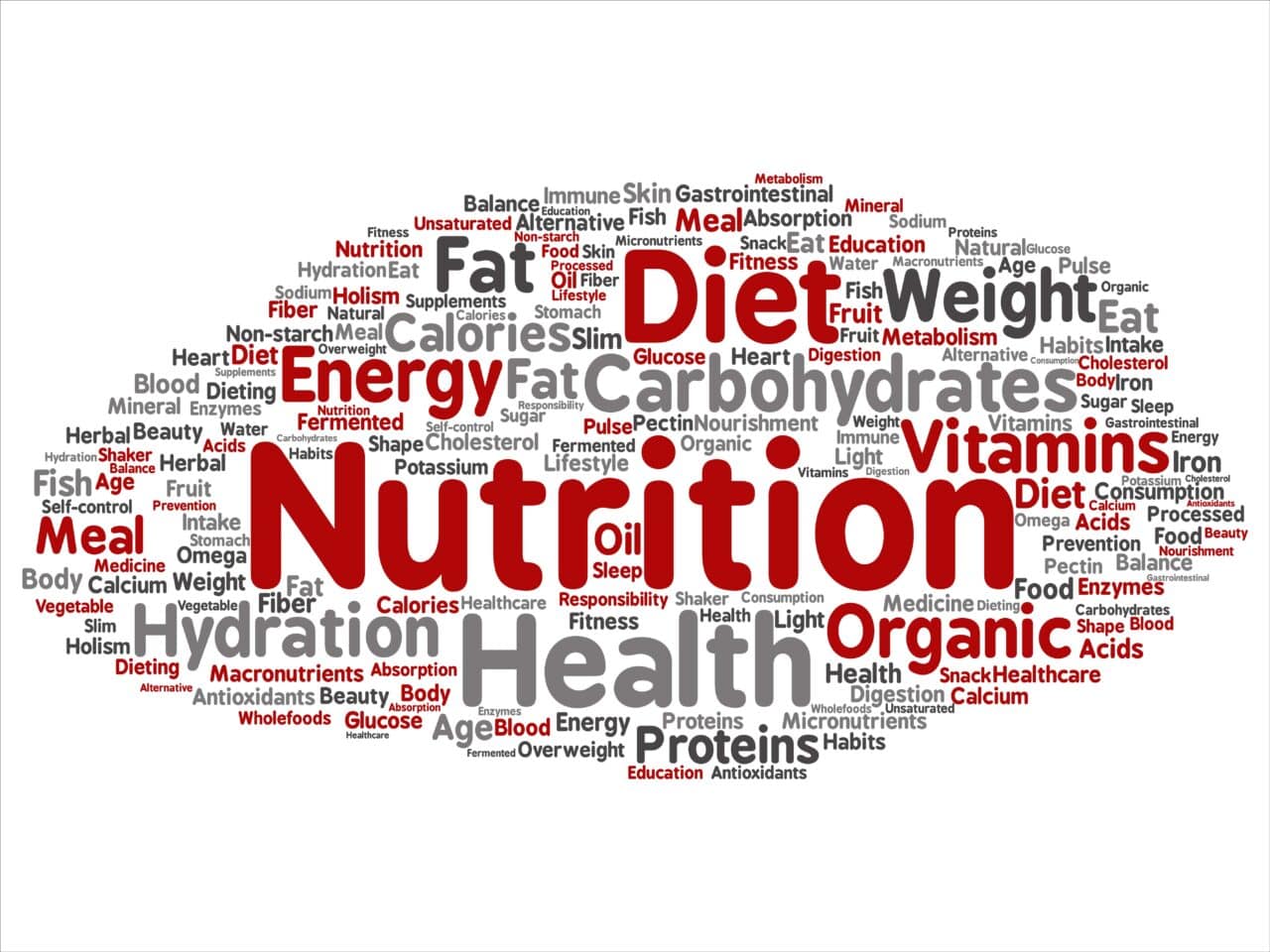
What is Lipase?
Lipase is an enzyme which plays a crucial role in fat digestion and absorption by breaking down triglycerides (fats) in food into smaller units of fatty acids and glycerol so that they can be absorbed by the body. It also aids the absorption of important fat-soluble nutrients such as vitamins A, D, E and K. Supplementation with lipase is associated with numerous benefits particularly for individuals with specific digestive issues or enzyme deficiencies, including encouraging normal nutrient digestion and absorption, supporting pancreatic enzyme levels, boosting immunity, and aiding weight management.
What does the science say about Lipase and digestion?
Low lipase levels are associated with a number of health issues in addition to poor nutrient digestion and absorption. These include gastrointestinal symptoms, elevated blood fat levels, and metabolic issues, such as type 2 diabetes. The common effects of indigestion, which include bloating, abdominal discomfort, nausea, and wind, can be due to the inefficient digestion of fat as a result of insufficient lipase levels.
There is a growing body of scientific literature which shows that lipase can help to address many of these issues (16, 17, 18)
The results of a study by Levine et al., (16) showed that supplementation with lipase immediately before a high fat meal significantly reduced feelings of fullness in comparison to a placebo.
In a similar study, Suarez and colleagues (17) investigated the effects of a lipase supplement on the severity of gastrointestinal symptoms after a high calorie, high fat meal in healthy individuals. The results showed that ingestion of lipase supplements was associated with a significant reduction in bloating, wind, and fullness during the dinner to bedtime. Considering these results, the authors concluded that the finding that lipase supplements reduce postprandial (after eating) symptoms in healthy subjects suggests that these supplements may also be beneficial for individuals suffering from irritable bowel syndrome.

What is Lactase?
Lactose is a natural sugar found in milk made from glucose and galactose, which provides an important source of energy, particularly for infants. Some people suffer from lactose intolerance. This is caused by a reduction or loss of the activity of the enzyme lactase, which is responsible for the digestion of lactose. It is characterised by symptoms such as abdominal pain, bloating, diarrhoea, and flatulence.
What does the science say about Lactase and digestion?
A common way of dealing with lactose intolerance is to not consume dairy products. The problem with this approach is that they are an important source of vitamins, minerals polyunsaturated fatty acids and proteins which provide numerous benefits for health and performance.
Alternatively, the science shows that the use of a lactase supplement provides a convenient way to consume dairy without experiencing the unpleasant issues associated lactose intolerance.
A clinical trial by Medow and colleagues (19) evaluated the effectiveness of a lactase supplement on the symptoms of lactose intolerance. Participants consumed either a lactase supplement or placebo (double-blind) immediately before drinking a solution of lactose. The results showed that supplementation with lactase reduced significantly abdominal pain, bloating, diarrhoea, and flatulence in comparison to a placebo.
The results of a study by Sanders et al., (20) showed a similar effect, with lactase supplementation reducing the severity of symptoms of lactose intolerance including abdominal cramping, belching, flatulence, and diarrhoea in lactose intolerant individuals after the consumption of whole milk in comparison to a placebo.
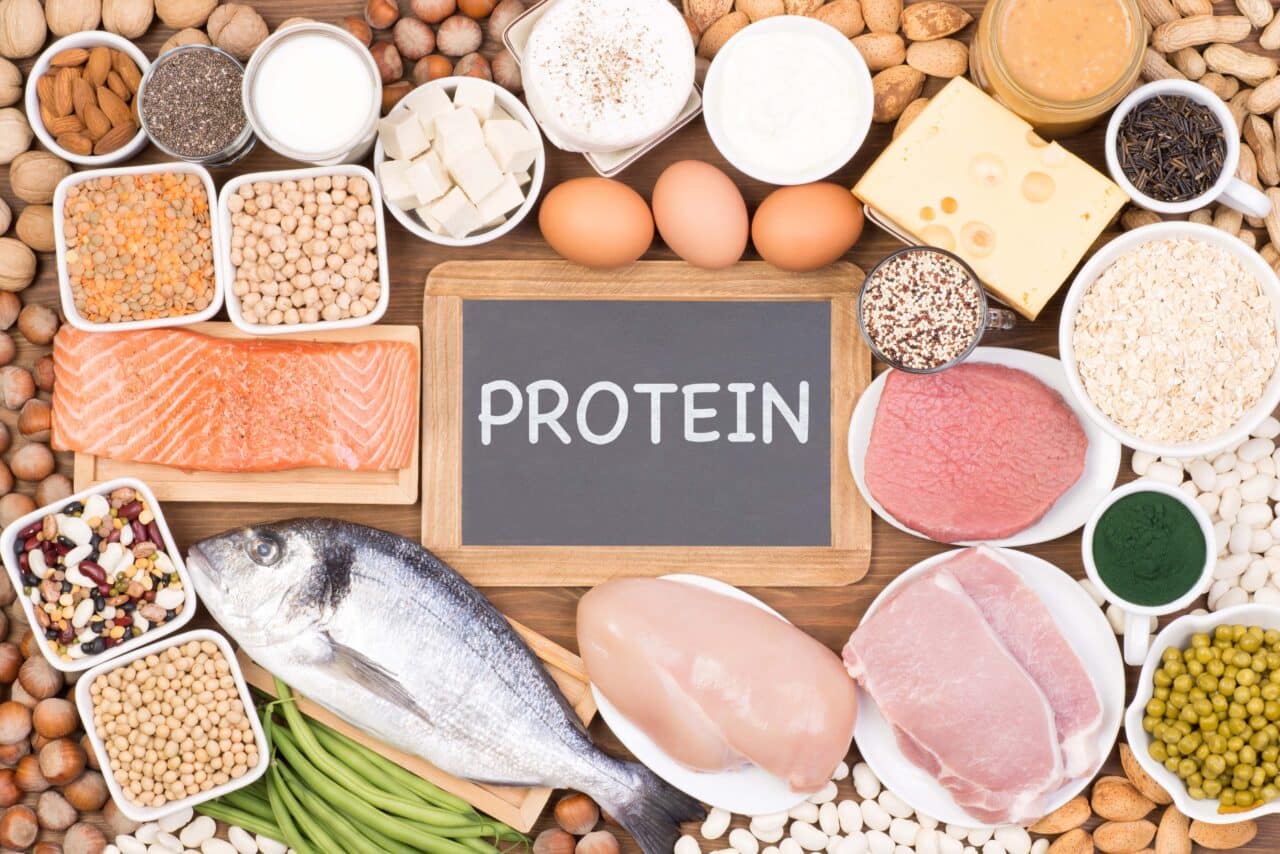
Time 4 Proteolytic Enzymes
Although some individuals may struggle to digest fats or lactose, protein is generally considered to be the most difficult nutrient to digest. For example, while carbohydrates are made up of simple sugars that break down relatively quickly, proteins are much more complex molecules. Consequently, protein digestion can be challenging for many people as the process of reducing protein foods to their basic amino acids is much more complicated and time-consuming. Red meat can be especially difficult for the body to digest due to the high protein and fat content. Which can lead to digestive discomfort.
Protein also tends to be the most expensive nutrient, so you want to make sure that you get the maximum benefit from the protein foods you consume.
To help you achieve this, we have added a special blend of naturally derived proteolytic enzymes. These are a particular type of enzyme that plays an important role in protein digestion and other vital processes. Protease, which we have already discussed, is a proteolytic enzyme produced by the body and also available as a supplement. Certain foods also contain proteolytic enzymes, which can enhance your protein digestion. Two of these are Papain and Bromelain.
When we consume protein-rich foods, such as meat, fish, or legumes, these proteolytic enzymes act as catalysts, accelerating the breakdown of the complex proteins into smaller and more manageable units that can be readily absorbed in the small intestine. This enhanced nutrient absorption contributes to better digestive health and overall health and wellbeing.
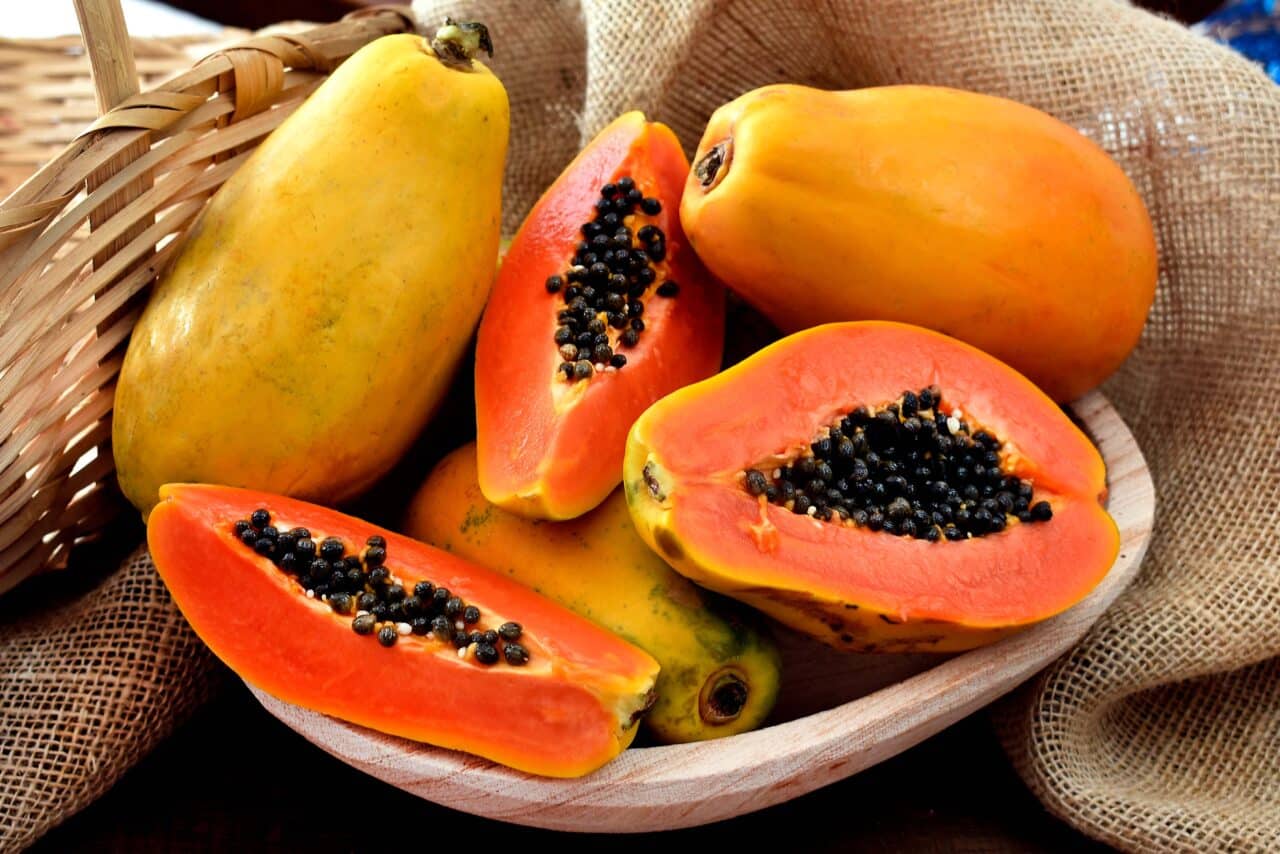
What is Papain?
Papain is a proteolytic enzyme extracted from the raw fruit of the papaya plant. Papaya is originally from the tropical regions of the Americas but it is now found growing in countries with tropical climates such as Hawaii, Florida, central Africa, India, and Australia. So effective is its ability to break down protein, that it has been used for thousands of years as a meat tenderizer. It has also been used in traditional medicine to reduce pain, inflammation, and swelling, improve digestion and to treat infections, diarrhoea, and allergies, and has been shown to have antioxidant, antimicrobial, immunological, liver-protective properties and other therapeutic attributes.
What does the science say about Papain and digestion?
Papain is typically used to facilitate the digestion of protein, enhance nutrient absorption, support overall digestive health and reduce the symptoms of poor digestion. This is supported by a variety of studies (21, 22, 23).
Muss and colleagues (21) investigated the effects of a Papaya preparation on digestive disorders. Participants with chronic digestive gastrointestinal tract issues consumed either the Papaya preparation or a placebo daily for 40 days. The results showed that Papaya contributed to the maintenance of a healthy digestive tract and improved various functional disturbances, such as the symptoms of IBS, which include bloating, constipation and discomfort.
A review of the nutritional and therapeutic potential of Papaya by Saeed et al., (22) highlighted its effectiveness as a digestive aid in the breakdown of proteins, as it has an action similar to that of the powerful proteolytic enzyme pepsin produced in the stomach. The authors suggest that as Papain can counter the toxic effect of gluten, it can be prescribed for individuals suffering from digestive issues including coeliac disease, who cannot digest the wheat protein gliadin but can tolerate it if it is treated with Papain.

What is Bromelain?
Bromelain is an extract from pineapples, particularly the stems or immature fruits. Consequently, it is sometimes referred to as pineapple extract. It has a centuries-long history of being used to treat a variety of ailments, primarily throughout Central and South America.
More recently it has been shown to have numerous health benefits including improving drug absorption, and the management of sinusitis, bronchitis, angina and surgical trauma. Additionally, it treats numerous cardiovascular conditions, diarrhoea, and osteoarthritis, boosts immune function, and also encourages apoptotic cell death (programmed cell death to remove unwanted cells).
Bromelain possesses a unique combination of proteolytic activities, making it highly effective for the breakdown of protein and to alleviate digestive issues such as bloating and wind. It is easily absorbed by the body without losing its proteolytic activity and without any major side effects (24).
What does the science say about Bromelain and digestion?
In addition to enhancing the digestion and absorption of protein, Bromelain has been shown to benefit the digestive system in a number of other ways.
Hale et al., (25) found that daily treatment with oral Bromelain reduced inflammation in the colon associated with inflammatory bowel disease. A study by Madkhali and colleagues (26) also found that Bromelain helps to protect the intestinal wall against the development of inflammation.
In normal digestion, food is moved through the digestive tract by rhythmic contractions called peristalsis. This process is referred to as gastrointestinal motility if it involves any part of the digestive tract. With motility disorders, this process can happen more quickly or slowly than normal. The disruption of the normal digestive process can cause a variety of symptoms, ranging from minor to severe. Borelli and colleagues found that Bromelain (27) has a beneficial effect on intestinal motility by slowing it down. This can help to manage diarrhoea, reduce the symptoms of IBS, such as abdominal pain and irregular bowel movements, alleviate the side effects of certain drugs, and reduce the nausea and vomiting associated with delayed emptying of the stomach, a condition called gastroparesis.
Stacking digestive enzymes with probiotics
‘Stacking’ is a term often used to describe the practice of taking multiple substances simultaneously to increase their effect. The science suggests that stacking digestive enzymes with other substances can provide a range of benefits. For example, as we have already seen, supplementation with protease enzymes blended with whey protein, increases the rate of protein absorption, resulting in significantly higher blood levels of amino acids and greater muscle protein synthesis (8).
Stacking digestive enzymes with probiotics has also shown to have a number of potential benefits. This should come as no surprise as both probiotics and digestive enzymes are two important components in maintaining a healthy gut. Probiotics are live bacteria that provide numerous benefits to the body, especially the digestive system.
For example, the results of a study by Kostiuchenko et al., (29) showed that supplementation with Bromelain and Papain has beneficial effects on the gut bacteria. Specifically, they are able to decrease an abundance of Proteobacteria, which are implicated in the development of certain diseases such as chronic gastritis and peptic ulcers, while increasing the beneficial Akkermansia muciniphila bacteria. These are associated with numerous benefits, including enhancing gut health, metabolic health and immune function.
When taken together, probiotics and digestive enzymes work synergistically to improve gut health. Probiotics create a favourable environment in the gut for the growth and function of beneficial bacteria, which in turn, enhances the effectiveness of digestive enzymes by providing optimal conditions for nutrient absorption. This not only helps to improve digestive health and nutrient absorption, but can also alleviate the symptoms of digestive disorders. For example, the bloating and constipation associated with conditions such as irritable bowel syndrome (IBS) may be improved by restoring the balance of gut bacteria and optimizing digestion. In addition, by promoting a healthy gut environment, probiotics and digestive enzymes can help to reduce inflammation in the digestive system and support overall gut health.
A review by Ianiro and colleagues (28) highlights the various benefits of combining probiotics and digestive enzymes and recommends this approach for the management of several gastrointestinal conditions, including celiac disease, Crohn’s disease, lactose intolerance, and bile acid deficiency.
Click here to learn more about Time 4 Synbiotic our Prebiotic & probiotic blend.

In conclusion….
It is well understood that we need the right amount and type of nutrients for optimal health and performance. Yet even if our nutrient intake is optimal, if we are not able to digest and absorb the food we consume effectively, we are not likely to gain the maximum potential benefit from our diet, and if our digestion is severely compromised, this can result in many of the same issues associated with malnutrition. The key to effective digestion is digestive enzymes. Although our body produces those we need naturally, sometimes nature needs a little help. This may be due a reduction in enzyme production as we age, chronic stress, an underlying health condition, the need for some assistance when consuming large volumes of food, or, on the hand, if you are on a restricted calorie diet and need to ensure that you are getting the maximum benefit from your limited intake to maintain good health. This is where Time 4 Digestive Enzymes can make a valuable contribute to your nutrition strategy. It contains a combination of 8 specially selected, evidence-based substances, including 6 different digestive enzymes, that work synergistically to aid digestion and optimise the absorption of nutrients. This not only reduces the symptoms of poor digestion, but also contributes to increased muscle protein synthesis, enhanced post exercise recovery and increased energy availability.
Note: The information in this article is not intended as medical advice. If you experience any gastrointestinal issues, you should consult a suitably qualified health care professional.
